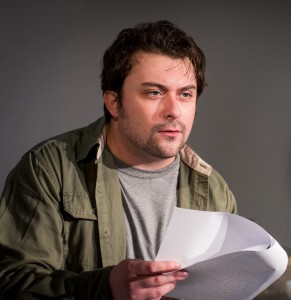German brothers Jacob and Wilhelm Grimm are best known for writing Cinderella, Sleeping Beauty, Snow White and many other famous fairy tales. There was also a darker side to the Grimms’ earlier works that included child abuse, incest and anti-Semitism. The short stories in Martin McDonagh’s The Pillowman echo the Grimms’ twisted side. The Pillowman takes place in a totalitarian state and deals with childhood abuse. The characters rarely experience a "Disney" fairy tale ending. Audiences are sure to be amused and horrified as this story unfolds.
The production opens with a proclamation from writer Katurian (Kirk Gostkowski) trying to weasel his way out of being tortured: “The only duty of a storyteller is to tell a story.” Detectives Tupolski (Deven Anderson) and Ariel (Paul Terkel) do not buy Katurian’s noble stand as a writer. Katurian recites one of his gruesome short stories The Tale of the Town on the River about a poor, little boy with no shoes who is bullied by the local children. One day the little boy offers a hooded driver a piece of the boy’s sandwich. The driver repays the boy by using a meat cleaver to cut off all of the boy’s toes on his right foot. The driver is supposed to be the Pied Piper and he is riding into the German town of Hamelin to lure away all of the children with his magical flute. Due to the boy’s missing toes, he is unable to walk as fast as the other children. The little boy is not taken away by the Pied Piper and becomes a Hamelin survivor.
Detectives Tupolski and Ariel claim they found the toes of a dead, Jewish boy in Katurian’s home. The detectives assert there is a connection between the crippled boy in Katurian’s short story "The Tale of the Town on the River" and the Jewish boy’s death. A string of other child deaths could be tied to Katurian’s violent short stories. Out of the four hundred stories Katurian wrote, he says “maybe ten or twenty have children in [them].” Audiences soon discover Katurian’s inspiration for these morbid stories in a film directed by David Rey. The film discloses the horrific abuse and neglect Katurian’s brother Michal (Kyle Kirkpatrick) experienced by their parents—which permanently left Michal “slow to get things.”
The value of this production is its ability to creatively show the effects of childhood abuse through the eyes of Katurian. As the main character and a family member, Katurian’s perspective is unique because he was never abused. His parents loved him and encouraged him to be a great writer. Audiences are able to connect with Michal’s suffering through Katurian’s love for his brother. Likewise, it is Gostkowski’s stellar performance as Katurian that carries this show. Katurian appears clever and likable, and at the same time, he feels so slippery. Audiences are left wondering if Katurian is telling the truth or lying about the murdered children in his stories.
Anderson is not fully self-expressed and authentic in his portrayal of Detective Tupolski. Director Greg Cicchino could have Anderson face the audience more often and project his voice so that audience members can get related to Anderson’s character during his opening lines. Instead of gauging the audience’s approval of his performance, Anderson could be more powerful by fully stepping into his role as the lead detective. As Detective Tupolski’s partner, Terkel maneuvers through the action scenes seamlessly in his performance of Detective Ariel. When Terkel slams Gostkowski’s head against the wall, the audience gains a real sense of what it is like to live in a totalitarian state. However, Terkel’s frequent use of herbal cigarettes starts to become a distraction and eventually does not add to his character. Kirkpatrick’s performance as Katurian’s mentally challenged brother Michal adds comic relief when Michal goes on about having an itchy butt.
Production designer Aaron Gonzalez created a simple, gray set that feels like a cross between a makeshift jail cell and an abandoned office during the height of the Cold War. The Chain Theatre is a fresh, friendly, intimate space with a gallery exhibition in the lobby by Tyler Hughes. The seating is connected, and if someone in your row is fidgeting throughout the show, their movements can be felt by others sitting in the same row. There is also simulated gunfire during the production for those who are sensitive to noise.
If you have not had a chance to see a performance of McDonagh’s award-winning play The Pillowman, then this is an opportunity to do so. Since its first public reading at London's Finborough Theatre in 1995, the play has traveled around the world. The use of universal, childhood fairy tales allows for generations to easily connect with the material. It is McDonagh’s take on childhood abuse that is most startling and thought-provoking for audiences to discover.
The Pillowman runs until Oct. 3 at the Chain Theatre (21-28 45th Rd. between 21 and 23 Sts.) in Long Island City, Queens. Evening performances are Wednesday-Saturday at 8 p.m. and matinee performances are Saturday and Sunday at 2 p.m. Tickets are $18 in advance and $20 at the door and can be purchased by calling 866-811-4111 or visiting www.variationstheatregroup.com.








